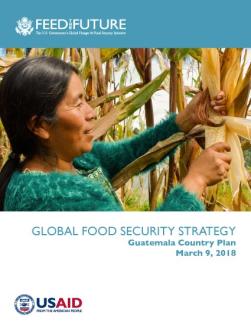
USAID’s Feed the Future activities reduce hunger, malnutrition, and poverty by increasing and stabilizing rural incomes and improving the nutritional status of rural and indigenous populations within the Western Highlands.
Since 2012, Feed the Future (FTF), the U.S. government’s flagship global food security initiative led by USAID, collaborates with the Government of Guatemala, private sector and academic partners, and local leaders at the community, municipal, departmental, and regional levels to reduce hunger, malnutrition, and poverty by achieving sustainable rural development and increased agricultural income.
USAID seeks to achieve sustainable rural development in more than 2,500 communities throughout the Western Highlands, through integrated programming in agriculture, economic development, healthcare, education, nutrition, adaptation to the impacts of climate change, local governance, and gender equity.
USAID supports market-based solutions to food insecurity and seeks to address the underlying economic factors that fuel it. As part of its holistic approach, USAID works to increase private sector investment, job creation and support the decentralization of basic service delivery to combat malnutrition.
CONTEXT AND CHALLENGES
Years of drought and crop failure have caused extreme food insecurity in Guatemala (one third of the population is food insecure), compelling rural residents to migrate. At 47 percent, Guatemala has the highest rate of stunting in the Western Hemisphere, the 6th highest rate in the world, with the prevalence rate reaching 70 percent in some parts of the predominantly indigenous Western Highlands.
While agriculture is the most labor-intensive sector in the Guatemalan economy—employing 33 percent of the population—it only contributes to 13.5 percent to the gross domestic product and offers limited opportunities for prosperity and growth. This landscape makes it difficult for rural Guatemalans to attain a better quality of life, and by one estimate, has driven 1.5 million Guatemalans to emigrate in the last 20 years.
Despite all of the above, Guatemala has tremendous potential for expanding its agricultural production which would lead to rural economic growth, job creation, and poverty alleviation. Guatemala is recognized as a leader in non-traditional agricultural exports in Central America, such as snow peas, green beans, mini-vegetables, and fruits, which have grown over the past ten years benefitting smallholder farmers in addition to traditional export products: coffee and cardamom.
GLOBAL FOOD SECURITY STRATEGY (GFSS) GUATEMALA COUNTRY PLAN
The GFSS Country Plan serves as an overarching framework for integrated food security and nutrition programming, identifying the key drivers of food insecurity, and malnutrition. The strategy includes projects that increase agricultural productivity, link farmers to markets, improve livelihoods, reduce vulnerability and malnutrition, and enhance resilience to shocks. The United States Government and other development partners support the Government of Guatemala to build the skills and experience necessary to effectively implement established policies; deliver agriculture, health, and nutrition services to target populations; and plan, budget, and execute public resources for needed programs in the future. In addition to program results below, monitoring shows that households that have participated in FTF activities have had less poverty backsliding in the past five years as well as higher reductions in stunting.


